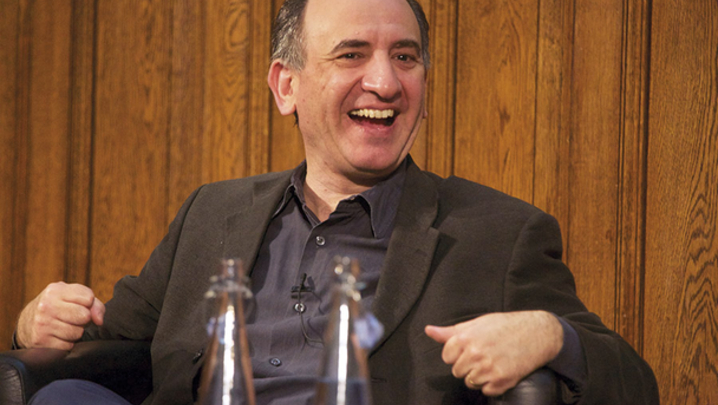Caitlin Danaher profiles Jesse Armstrong who, despite writing some of the foulest dialogue on TV, is nothing like his toxic characters.
Just a fortnight after a universally acclaimed finale brought Succession to a triumphant conclusion, one might have expected the showrunner of HBO’s mega hit to be enjoying some well-earned R&R, perhaps chartering a yacht in the French Riviera, or retreating to a mansion in the Hollywood hills.
Instead, Jesse Armstrong could be found attending a rally in arguably the least relaxing place on Earth, plonked, during a heatwave, between M&M’s, Wetherspoons and the giant Odeon in the visceral nightmare that is Leicester Square.
Having spent the past eight years painting an eviscerating portrait of the depravity and emotional agony in the lives of the 1% in Succession, the British writer’s refusal to be seduced by the extravagances of the super-rich comes as no great surprise.
If anyone has earned a bit of a break, it’s surely Armstrong. Instead, gathered around a statue of William Shakespeare, Armstrong joined his fellow scribes in a show of solidarity for their American counterparts taking part in the WGA writers’ strike.
The following day, he takes to the stage of a relatively small lecture theatre to talk politics and drama at the Orwell Festival, held at UCL’s Euston campus. Despite being the brains behind some of Britain’s sharpest and most beloved comedies, from the cult cringe Peep Show, created with his long-standing writing partner Sam Bain, to writing on Armando Iannucci’s scathing political satire The Thick of It, he seems unable to comprehend that the crowd of fascinated listeners have come to hear about his life, rather than that of George Orwell.
'I always say that Jesse is a brilliant writer and an even better person' - Jamie Carragher
Indeed, when hosts Geoff Lloyd and Sara Barron ask the audience to stand up if they’ve ever seen Succession, Armstrong’s response to the fully upstanding room is one of suspicion: “Some of you could be lying?”
Over the course of the hour-long discussion, the writer shares details of his idyllic upbringing in the Shropshire countryside with his “hippy tolerant” parents. “They’d hate to be described as hippies,” he says. Growing up on the Welsh border, where a countercultural influence flourished, the vegetarian Armstrongs lived with a certain level of self-sufficiency: think home-grown vegetables and eggs from pet, formerly factory hens.
It was worlds away from the toxic, dysfunctional dynamics of his invented Roy family. His father, David Armstrong, a teacher turned crime novelist, recently described Armstrong as “a sterling fellow” on BBC Radio 4’s Profile, saying that he “couldn’t be blessed with a lovelier son”.
It’s not just his own dad singing his praises. Such warmth is echoed by those who worked with Armstrong in the Succession writers room. “I always say that Jesse is a brilliant writer and an even better person,” says Jamie Carragher, who began his journey on Succession as writer’s assistant to Armstrong, before being promoted to staff writer and story editor.
As Armstrong’s right-hand man, Carragher worked closely with the showrunner for five years, and claims his only vice is his split allegiance between Manchester United and Fulham football clubs, like a human half-and-half scarf. The only whiff of tyranny came when Armstrong banned any discussion of the Beatles documentary series Get Back, because his room of writers could not stop talking about it.
As for asserting his “very highfalutin, elitist taste”, the showrunner was not afraid to urge his fellow writers to watch Michael McIntyre’s gameshow The Wheel. “He’s a very positive, content person,” Carragher says. “I’m reluctant to ascribe a Buddha-like happiness to him if that’s not what he would claim, but I just know how he led the room, which was always with a lot of fairness and a lot of generosity to all the writers.”
Armstrong’s ability to write lines for some of the nastiest, venom-spitting narcissists committed to screen is as much a shock to his frequent collaborators as it is us.
“He looks quite respectable, so I’m always surprised when he comes up with something that is like the foulest thing you’ve ever heard,” says Armando Iannucci, who picked Armstrong to join his team of writers on The Thick of It.
While Peep Show saw Armstrong and Bain explore modern masculinity through the hilariously awkward, oddball male friendship between flatmates Mark and Jez, played by David Mitchell and Robert Webb, The Thick of It saw Armstrong join forces with Iannucci, Simon Blackwell and Tony Roche to create a world of profanity-laden failing politicians and hapless advisors, who valued presentation over policy.
“There’s something about [Armstrong’s] scenes that seem very real and very natural and, yet, instantly funny. While you’re reading them, you’re already picturing the scene happening in your head,” Iannucci says. “The dialogue is so natural and flowing, it has a rhythm and a pace to it, and it just becomes infectiously funny.”
Unbeknown to Iannucci at the time, Armstrong had real-life experience in politics, having worked as a researcher for the Labour Party in the late 1990s. Yet the writer is the first to admit that his lack of interest in gossip and hatred of networking meant he was not suited for the political arena.
His one and only encounter with anyone of real influence occurred when he accidentally rounded a corner and bumped into a track-suited Prime Minister at the 1996 Labour Conference. “My only interchange with high-level power was thinking Tony Blair was a bit like Tony Soprano,” he quipped at the Orwell Festival.
'He looks quite respectable, so I’m always surprised when he comes up with something that is like the foulest thing you’ve ever heard' - Armando Iannucci
Years later and another collaboration with Iannucci saw Armstrong working with the actual Tony Soprano, James Gandolfini, who played the anti-war Lt General Miller in the cinematic Thick of It spin-off, In the Loop. Iannucci recalls how one of the film’s most iconic scenes, where Miller uses a kid’s toy in a child’s bedroom to morbidly calculate that 12,000 troops will likely become casualties of war, was in the very first draft of Armstrong’s script.
“He has a kind of sure touch that means it just arrives kind of done,” Iannucci says. In the Loop saw Iannucci, Armstrong, Roche and Blackwell gain an Academy Award nomination for Adapted Screenplay. Iannucci described their fish-out-of-water experience at the Oscars as hilarious: “It was that incredibly British thing of being like, ‘should we really be here?’ I remember going to the Oscars in this big stretch limo with our wives and girlfriends, laughing away, thinking this is hilarious, and then realising no, this is what people book stretch limos to pretend that they’re doing. Except that we were doing it, you know, which made it all the funnier.”
Iannucci reflects that Armstrong’s sitcom origins perhaps provided a perfect training ground for writing Succession. “Comedy is hard, because there’s one test and one test only: is it funny? It’s a really good discipline, it’s really good on economy, forcing you to pare it right down to the absolute bare minimum that will make that moment funny,” Iannucci explains. “With something like Succession, which is both funny and a drama, you can see the experience of being put through that discipline, of [Armstrong having] been trained into making each moment work and have an effect.”
Indeed, Succession’s story editor Carragher likens the electric moments of magic in the writers room to a really good improv troop. “When everyone’s ‘yes, and-ing’ and coming up with loads of possibilities, the day goes a hell of a lot quicker when that lightning strikes,” he says.
So, perhaps it is no surprise that, despite Succession’s induction to the pantheon of prestige TV dramas, Armstrong tells the crowd at the Orwell Festival that he still thinks of himself primarily as a comedy writer.
As for what lies ahead for Armstrong, the answer is anyone’s guess. “He knows his voice and he’s always been very smart with what he wants to do,” Iannucci says. “I’m sure the next thing he does will be the thing you least expect.”




